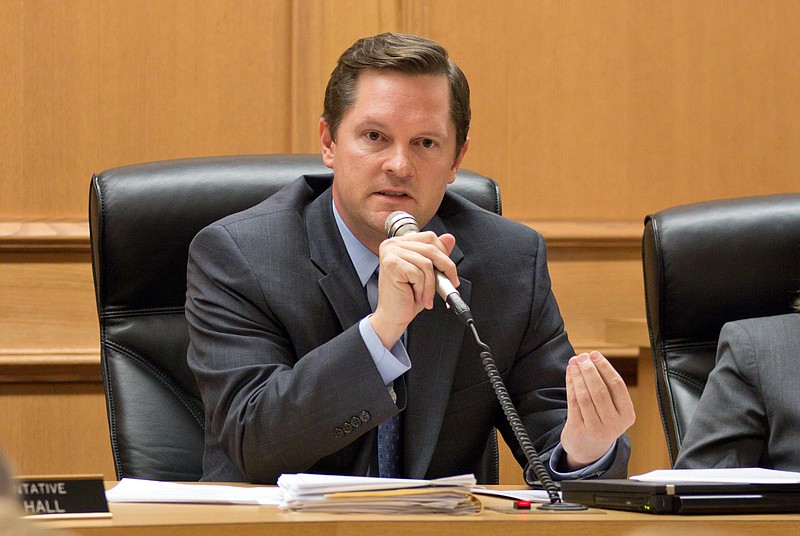Tennessee's state legislators braced for another busy year in health care policy as the General Assembly kicked off its second year of the session this week.
And although consensus on how to tackle big issues may vary, concern for the health of the state's residents touches both sides of the aisle.
"Health care has become one of the top issues in the state as well as the U.S.," said Rep. Cameron Sexton, R-Crossville, chairman of the House Health Committee. "There's a lot of concerns out there by providers and patients, and trying to strike the right balance between all those entities is very key to finding the right solutions."
Health and social services make up the largest portion - 45 percent - of the state's budget, followed by education at 29 percent, yet Tennessee consistently ranks in the bottom nationally on key health indicators, according to a health and budget policy report released this week by the nonprofit Sycamore Institute.
But with many stakeholders and concerns on the table, here are a few issues to watch this season in the wake of week one:
Medicaid
From protests calling for its expansion on Tuesday to the Trump administration's go-ahead Thursday allowing states to issue work requirements for able-bodied enrollees, it's hard to escape chatter about the health insurance program Medicaid, better known in the state as TennCare.
Medicaid, along with the Children's Health Insurance Program, covers an estimated 1.6 million low-income children, pregnant mothers, parents, caretakers and disabled Tennesseans. However, the left and many advocates argue the program could insure more people if state legislators accepted federal dollars offered through the Affordable Care Act to expand the program.
"The legislature has blocked Gov. [Bill] Haslam from using federal health funds, funds that Tennesseans send to Washington as tax dollars, to address the health needs of our state," said Bill Zechman, a McMinnville health insurance agent.
Zechman was one of several health care organization representatives who called on lawmakers to reconsider Medicaid expansion in a teleconference on Tuesday.
But Senate Speaker Randy McNally, R-Oak Ridge, told reporters during a discussion with other top GOP leaders that he doesn't see much support for Medicaid expansion.
"I think there's a lot of concern about the impact it would have on the health system, as well as the budget," he said. "The devil's in the details."
Rural Health Care
Provider shortages, transportation issues, economic challenges and higher rates of chronic disease create significant health challenges for rural Tennesseans, who make up about 22 percent of the state's population.
Since 2010, Tennessee has lost 10 rural hospitals - the highest rate of rural hospital closures in the nation - and many more are at risk of closing or strain to stay afloat.
Champions of Medicaid expansion blame the closures on costs of providing uncompensated care to high volumes of uninsured, would-be beneficiaries, but McNally and Senate Finance Committee Chairman Bo Watson, R-Hixson, say it's not that simple.
"A lot of the rural hospitals, it's very difficult for them to survive in today's environment and that's partially due to the patient mix they see," McNally said, adding that because they have a high percentage of Medicare and Medicaid patients "it's difficult to survive."
He and Watson, also a Senate Health Committee member and director of Sports Medicine and Therapy Services at Parkridge Medical Center, cited a lack of "economy of scale" because of the low number of patients in rural areas.
"A lot of the cost of running a hospital in the 21st century is operational efficiencies that require a level of sophistication that many of the rural areas don't have," added Watson, noting that a rural hospital chief executive officer may simultaneously have responsibilities that in a larger facility would be handled by a chief financial officer, chief operating officer and even chief nursing officer.
Chronic Disease and Addiction
When looking for areas of bipartisan agreement, lawmakers are united in the belief that many of the state's health issues are a result of "preventable" conditions.
High rates of chronic diseases, such as obesity, diabetes, hypertension, stroke, cancer, heart disease and depression, plague the state, and are often caused or exacerbated by controllable behaviors, such as lack of exercise, tobacco use, substance abuse and other damaging lifestyle choices.
"We've got to look more toward the preventative health, because as Chairman Watson is seeing, health care is becoming such a huge part of our budget that if we don't do something it's going to be unsustainable," Sen. Becky Duncan Massey, R-Knoxville, said during a Senate Health Committee meeting on Wednesday.
Sen. Richard Briggs, R-Knoxville, pointed to the challenge of legislating behaviors, "particularly if you're competing eating apples with eating pizza," but said the state's opioid epidemic is an area needing more attention.
"The one that I think we're really going to have to start focusing on, that legislation can have an impact on, deals with this opioid crisis that we have in this state," he said.
To date, Tennessee's primary legislative response to the crisis has focused on limiting the abundance of prescription painkillers, which successfully reduced the number of opioid prescriptions in the state. But drug overdose death rates, now driven largely by heroin and fentanyl use, continue to rise.
Contact staff writer Elizabeth Fite at efite@timesfreepress.com or 423-757-6673.
